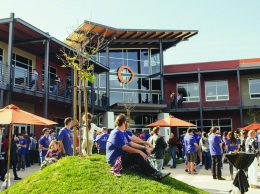Ventura backs out of its brief adventure in venture capital funding

Stephen Nellis
The city of Ventura is near the end of its relationship with DFJ Frontier, a venture capital fund associated with Draper Fisher Jurvetson with an outpost in Santa Barbara.
Back in 2007, Ventura’s city leaders set aside $5 million for economic development. Of that, the city sunk about $400,000 into revamping the space above City Hall on Poli Street into the Ventura Ventures Technology Center. But the biggest chunk went to two investment funds: a $3 million contribution to DFJ Frontier’s second fund, and a $1.6 million fund of the city’s own to take direct stakes in startups.
The idea was that DFJ Frontier would do its best to invest in companies in Ventura, and that the city would invest in companies that could potentially create well-paying jobs in its jurisdiction.
But putting a geographical constraint on investment is tough. DFJ Frontier struggled to make the Ventura connection. For its part, the city invested $180,000 in Lottay, an online gifting service that’s now out of business; $425,000 in MomentFeed, a location-based marketing service; and $500,00 in SwinkTV, a firm that creates visual data maps of sports game footage to show where the important plays happen.
Out of those firms, only MomentFeed still has a presence in Ventura, though its headquarters are listed as being in Santa Monica. It’s still viable, and so is SwinkTV, which just raised $5.5 million but has moved to Venice Beach.
In November, the City Council voted 6-1 to dissolve the investment funds and use the cash to replenish some accounts — Ventura’s public liability fund and its workers compensation fund — that the city had borrowed from during the recession for basic services like street repair.
But getting out of a limited partnership arrangement isn’t simple. The city must sell its stake in the DFJ Frontier fund on the secondary market, where it will receive only 60 percent of the face value of the principle. The city also invested about $1.1 million of its own $1.6 million investment fund, and that money will remain invested.
Overall, the city will get back about $2.3 million in cash.
Joseph Briglio, who oversees the city’s tech incubator, said the transaction should close by the end of the month.
“Anything that’s been borrowed from or has lost money over the past few years, [Ventura City Manager Mark Watkins] has been looking to replenish to balance the organization,” Briglio said. “He viewed this partnership as very risky for a public entity like ourselves to be part of, and the payoff takes quite some time.”
That’s not to say there have been no successes. The incubator space remains intact and will continue. If I had to place a bet today on which company will become Ventura’s first publicly traded tech firm, I’d pick two companies that incubated there: The Trade Desk, which is headed by former AdECN executive Jeff Green and is now paying market-rate rent just above the incubator on the fifth floor, or Connexity, the brainchild of the founders of Fastclick, which was sold to ValueClick.
The incubator has also not cost the city a dime beyond the initial $400,000 for remodeling the space. “It’s sustaining itself now and will continue to do so for the near term,” Briglio said.
CLU’s new incubator
Speaking of incubators, California Lutheran University has a new one on tap for Westlake Village.
The Thousand Oaks-based university said it will open a Westlake Village location this year to house a co-work-style incubator, its graduate business programs and its Center for Economic Research and Forecasting, led by economist Bill Watkins.
The space at 31416 Agoura Drive in the new LC3: Lindero Canyon Creative Campus will be an 18,000-square-foot facility with four classrooms and five offices wrapped around a co-working space. That effort joins a recently announced seed fund for student startups.
CLU President Chris Kimball said the goal is to embrace the emerging Conejo Valley startup culture and give students a chance to rub shoulders with real-world entrepreneurs on a regular basis.
“We want to work with community-based startups, ones that feed off the high-tech corridor we have here. We’d like to be able to do something for the entrepreneurs we have in the region so they don’t have to go to Santa Monica,” Kimball said. “What we really hope is that [students] get inspired and unleash their own entrepreneurial ideas and move in.”
The new facility will also be more easily accessible from Highway 101.
• Contact technology columnist Stephen Nellis at [email protected].











